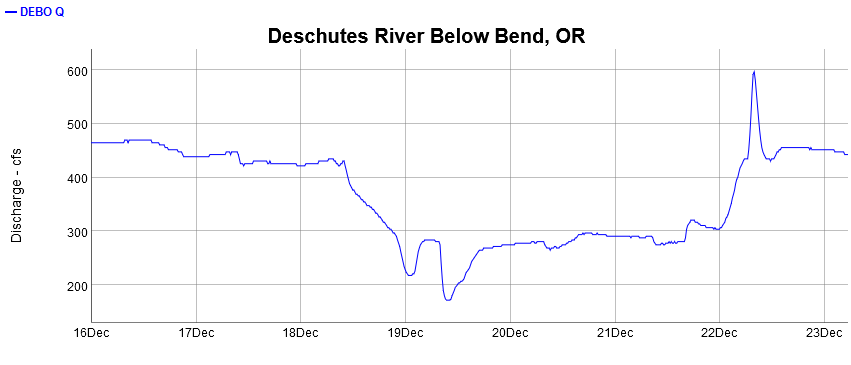
Central Oregon Irrigation District has now finished their latest “stock run” and you can see its impact on the Middle Deschutes below Bend. Over the course of 5 days the river level has fluctuated wildly with a low of 172 cfs and a high of 592 cfs. Such dramatic swings in a short period of time expose the river bed and its plants and aquatic insects to potentially lethally low temperatures. High flows then generate sediment which chokes spawning beds. Of course, this has been going on for years. With all the focus on restoring the Upper Deschutes (the river above Bend), the Middle Deschutes continues to be an irrigation ditch.
A “stock run” is when water is diverted from the Middle Deschutes in the winter in order to allow ponds to be filled, ostensibly for the welfare of livestock. Of course, ponds are often used by irrigation district patrons simply for landscaping. Clearly, livestock must have water to drink, but there is no reason to create such wild fluctuations in the river.

Here’s a recent photo from COID. I assume it is intended to show how irrigation water is used to irrigate cow pastures as well as provide drinking water for them. The photo also illustrates how irrigation canals become contaminated with bacteria from manure. In many places this bacteria is ultimately transported to the Crooked and Middle Deschutes rivers from canal “end spills”.
End spills are places where water simply spills out of the end of a canal. In some places this occurs on open land while in other places the spill goes into the Crooked or Middle Deschutes rivers. These spills filled with animal waste, other agricultural wastes like fertilizer, and the water can be at high temperature. All of these negatively impact the rivers that receive this polluted water.
Piping canals will ultimately solve many of these issues but it is going to take decades and astonishing amounts of taxpayer money. In the meantime, the irrigation withdrawals could be managed in a way that is less detrimental to the Middle Deschutes.
